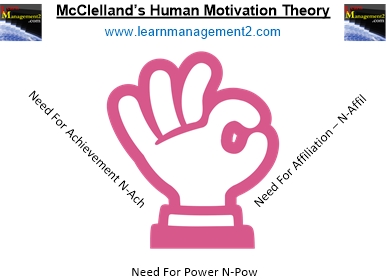Human Motivation Theory
David McClelland
Introduction
One of McClelland’s most well known theories is that human motivation, is dominated by three needs. McClelland's theory, sometimes referred to as the three need theory or as the learned needs theory, categorises the needs as follows;
- the need for achievement - N-Ach
- the need for power - N-Pow
- the need for affiliation - N-Affil
In this article we explain how each need works and the influence of each need on a person.
This diagram captures the three needs in McClelland's Human Motivation Theory
What Influences The Impact Of McClelland's Needs On A Person
The importance of each of these needs will vary from one person to another. If you can determine the importance of each of these needs to an individual, it will help you decide how to influence that individual.
McClelland asserted that a person’s needs are influenced by their cultural background and life experiences. He also asserted that the majority of these needs can be classified as the needs for affiliation, achievement or power. A person’s motivation and effectiveness can be increased through an environment, which provides them with their ideal mix of each of the three needs (N-Ach, N-Pow and N-Affil).
The Need For Affiliation (N-Affil)
The need for affiliation is about forming friendly relationships and positive human interaction. There is a need “to feel liked” and “accepted” by others. A person with a high need for affiliation is likely to be a team player and thrive in a customer services environment. They will perform best in a co-operative environment. McClelland said that a strong need for affiliation will interfere with a manager’s objectivity. The “need to be liked” will affect a manager’s decisions, it may push them into making decisions that increase their popularity rather than furthering the interests of the organisation.
The Need For Power (N-Pow)
A person that has a need for power will want to lead others and make an impact.
This need can exhibit itself in two ways. The first which is the need for personal power may be viewed as undesirable as the person simply needs to feel that they have “power over others”. They don’t have to be effective or further the objectives of their employer.
The second type of “need for power” is the need for institutional power. People with the need for institutional power; want to direct the efforts of their team, to further the objectives of their organisation.
Next Page
